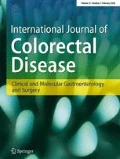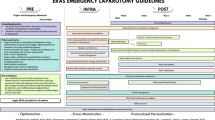Abstract
Purpose
Enhanced Recovery Programmes (ERP) result in shorter hospital stay after colonic resection with no increase in complication, mortality or readmission rates. There is little data regarding the use of an ERP after rectal resection. We investigated the effect of introducing laparoscopic surgery and the ERP on outcomes in our unit.
Methods
From February 2007, elective patients undergoing rectal resection (laparoscopic or open) under the care of two colorectal surgeons were placed into the ERP. Length of stay (LOS) was recorded as total LOS, including readmissions. Comparison was made with a cohort of patients from 2004–2005 before the onset of laparoscopic surgery/ERP.
Results
Forty patients in the ERP group were compared with 42 patients from 2004–2005. Morbidity and mortality rates were similar. LOS was shorter in the ERP group cf. the retrospective group (median 7 days vs. 11 days; p = 0.002). Median LOS was shorter in both laparoscopic ERP patients (6 days cf. 11 days; p = 0.004) and open ERP patients (7 days cf. 11 days; p = 0.014) cf. the retrospective group.
Conclusion
Patients having rectal resections benefit from a multimodal approach to surgery with significant reductions in LOS, but no change in morbidity or mortality.

Similar content being viewed by others
References
Andersen J, Hjort-Jakobsen D, Christiansen PS, Kehlet H (2007) Readmission rates after a planned hospital stay of 2 versus 3 days in fast-track colonic surgery. Br J Surg 94(7):890–893
Gouvas N, Tan E, Windsor A, Xynos E, Tekkis PP (2009) Fast-track vs. standard care in colorectal surgery: a meta-analysis update. Int J Colorectal Dis 24(10):1119–1131, Epub 2009 May 5
Spatz H, Zülke C, Beham A, Agha A, Bolder U, Krenz D, Fürst A, Lattermann R, Gröppner G, Hemmerich B, Piso P, Schlitt H (2006) “Fast track” for laparoscopic assisted rectum resection—what can be achieved? First results of a feasibility study. Zentralbl Chir 131(5):383–387, German
Schwenk W, Neudecker J, Raue W, Haase O, Müller JM (2006) “Fast-track” rehabilitation after rectal cancer resection. Int J Colorectal Dis 21(6):547–553, Epub 2005 Nov 9
Lindsetmo RO, Champagne B, Delaney CP (2009) Laparoscopic rectal resections and fast-track surgery: what can be expected? Am J Surg 197(3):408–412
Veldkamp R, Kuhry E, Hop WC, Jeekel J, Kazemier G, Bonjer HJ, Haglind E, Påhlman L, Cuesta MA, Msika S, Morino M, Lacy AM, COlon cancer Laparoscopic or Open Resection Study Group (COLOR) (2005) Laparoscopic surgery versus open surgery for colon cancer: short-term outcomes of a randomised trial. Lancet Oncol 6(7):477–484, 7
Guillou PJ, Quirke P, Thorpe H et al (2005) Short-term endpoints of conventional versus laparoscopic-assisted surgery in patients with colorectal cancer (MRC CLASICC trial): multicentre, randomised controlled trial. Lancet 365:1718–1726
Lacy AM, Garcia-Valdecasas JC, Delgado S et al (2002) Laparoscopy-assisted colectomy versus open colectomy for treatment of non-metastatic colon cancer: a randomised trial. Lancet 359:2224–2229
Aziz O, Constantinides V, Tekkis PP, Athanasiou T, Purkayastha S, Paraskeva P, Darzi AW, Heriot AG (2006) Laparoscopic versus open surgery for rectal cancer: a meta-analysis. Ann Surg Oncol 13(3):413–424, Epub 2006 Feb 1
Yamamoto S, Fukunaga M, Miyajima N, Okuda J, Konishi F (2009) Japan Society of Laparoscopic Colorectal Surgery. Impact of conversion on surgical outcomes after laparoscopic operation for rectal carcinoma: a retrospective study of 1, 073 patients. J Am Coll Surg 208(3):383–389
Agha A, Fürst A, Iesalnieks I, Fichtner-Feigl S, Ghali N, Krenz D, Anthuber M, Jauch KW, Piso P, Schlitt HJ (2008) Conversion rate in 300 laparoscopic rectal resections and its influence on morbidity and oncological outcome. Int J Colorectal Dis 23(4):409–417
Maessen J, Dejong CH, Hausel J, Nygren J, Lassen K, Andersen J, Kessels AG, Revhaug A, Kehlet H, Ljungqvist O, Fearon KC, von Meyenfeldt MF (2007) A protocol is not enough to implement an enhanced recovery programme for colorectal resection. Br J Surg 94(2):224–231
Author information
Authors and Affiliations
Corresponding author
Rights and permissions
About this article
Cite this article
Branagan, G., Richardson, L., Shetty, A. et al. An enhanced recovery programme reduces length of stay after rectal surgery. Int J Colorectal Dis 25, 1359–1362 (2010). https://doi.org/10.1007/s00384-010-1032-4
Accepted:
Published:
Issue Date:
DOI: https://doi.org/10.1007/s00384-010-1032-4




